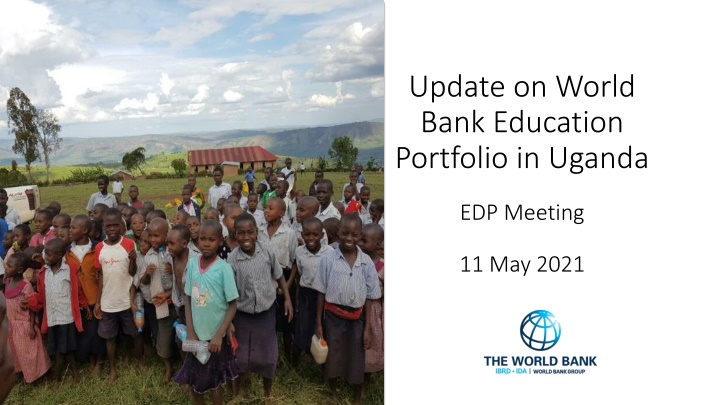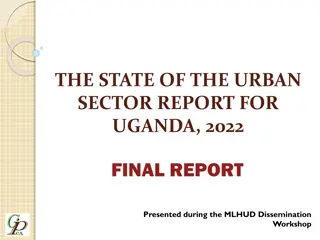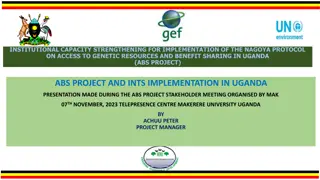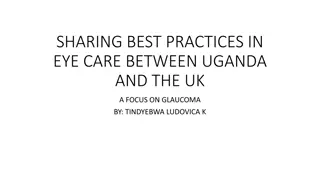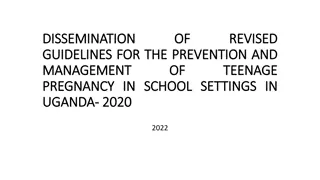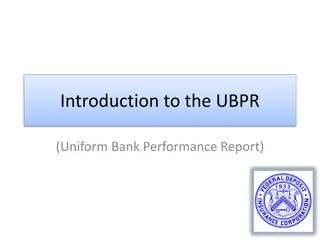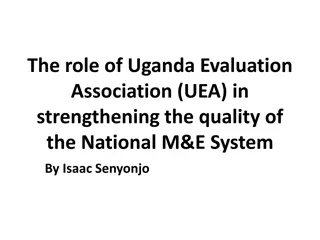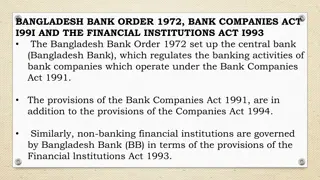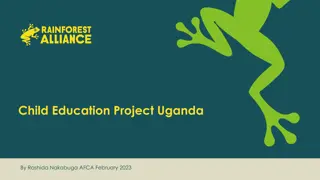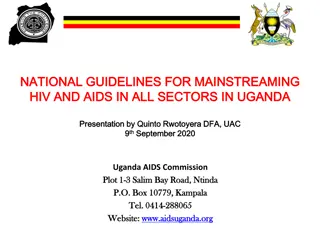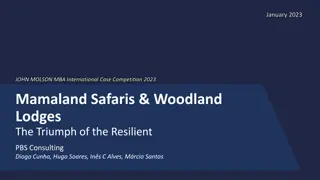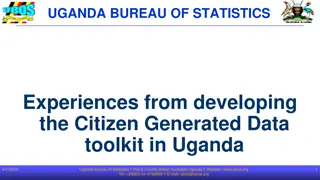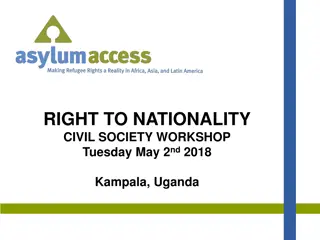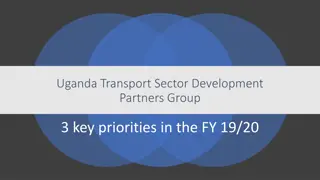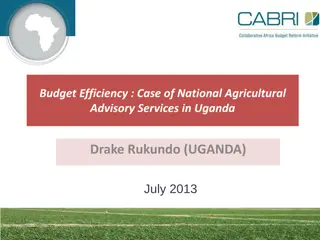Enhancing Education in Uganda: A World Bank Initiative
The World Bank's portfolio in Uganda focuses on addressing challenges in the education sector such as high dropout rates, declining learning outcomes, and limited access to education, especially for women and girls. The response includes initiatives to improve service delivery, strengthen equity, and drive systemic reforms. Projects like the Early Learning Continuity Grant and the COVID-19 Education Response Project aim to support learning continuity during the pandemic. The efforts aim to lift the education standards and opportunities for Uganda's young population.
Download Presentation

Please find below an Image/Link to download the presentation.
The content on the website is provided AS IS for your information and personal use only. It may not be sold, licensed, or shared on other websites without obtaining consent from the author.If you encounter any issues during the download, it is possible that the publisher has removed the file from their server.
You are allowed to download the files provided on this website for personal or commercial use, subject to the condition that they are used lawfully. All files are the property of their respective owners.
The content on the website is provided AS IS for your information and personal use only. It may not be sold, licensed, or shared on other websites without obtaining consent from the author.
E N D
Presentation Transcript
Update on World Bank Education Portfolio in Uganda EDP Meeting 11 May 2021
CURRENT SITUATION High dropout in primary education Low and declining learning outcomes Uganda s young population yet children do not reach even half of their potential LOW and WORSENING learning outcomes primary Learning gap of 2.5 years Official completion rates lower than 5 years ago (63% vs 61%) Worsening LO at beginning and end of P1 to P7 survival rates one of the lowest in Africa Learning poverty of 83% LIMITED ACCESS TO EDUCATION OF WOMEN AND GIRLS or DIGIAL SKILLS education Low access to secondary education Insufficient financing for Violence against children 93% of boys and 94% of girls aged 11-14 in 2017 have experienced physical violence from teachers Access remains low (below 30%) and highly unequal 2.5 % (2018) of GDP .. Below regional average (4.0%) and its income group (3.6%)
WORLD BANK RESPONSE 1. Improved service delivery: Supported reduction in teacher absenteeism (to 9% in GPE districts), EGR training model to be scaled up by MoES, improved provision of learning materials (from 14:1, 2:1) also in time of crisis (C-19 rapid response results). Improved skills training & opportunities for employment in key growth sectors (oil & gas, agriculture & construction) 2. Strengthened equity response: Addressing education needs of refugee and host communities, girls & lower income (UTSEP, UgIFT, USEEP, PROSPECTS) 1. Driving to systemic reforms: Supported development of key policies ECD & Uganda Skills Policy
Project Project Scope Scope Performance Performance Grant of 30,000 USD for Early Learning continuity in COVID -19 Support towards the development harmonized Parent Boost Guide Objective is to support parents to facilitate early learning at home through age-appropriate activities. Aligned to the Early Learning framework Targets parents caregivers with children 3- 5 years Parenting Support for Early Learning Continuity Radio Scripts have been developed for radio programmes A pilot radio programme will be conducted in 4 districts through radio talk shows A roll out plan for the Parent Boost Guide has been developed to mobilise resources for printing, translation and dissemination. of the and
Project Project Scope Scope Performance Performance COVID19 Education COVID19 Education Response Project Response Project A $14.7m grant financed by GPE Accelerating Fund. The project supports continuity of learning and the re-opening of schools (from pre-primary to lower secondary) as a result of the COVID19 pandemic. The project has been approved and Effectiveness is expected in mid-October. It s a short-term emergency response project, which has made good implementation progress across all components. the signed.
Project Project Scope Scope Performance Performance construction of schools Safe school programme support hosting districts Teacher development Policy support Uganda Secondary Uganda Secondary Education Expansion Project Education Expansion Project (USEEP) (USEEP) $150m ($50m from IDA 18 and Refuge Window) includes Project awaiting effectiveness. to refugee Universal secondary Education (USE) Policy; National Private Training Policy; National Curriculum, Assessment and Placement Policy; National Science Education Policy. National School Construction Strategy National Teacher Retention Strategy. Education and
Project Project Scope Scope Performance Performance A Uganda Intergovernmental Uganda Intergovernmental Fiscal Transfers Project Fiscal Transfers Project ( (UgIFT UgIFT) ) P4R intervention to increase UgIFT parent project had limited sectoral scope (beyond fiscal transfers) and ownership. Additional Financing offers deepened sectoral scope where financial and performance management incentives LG and facilities level are combined to improve service delivery. aimed budgetary allocation to local governments in health and education sectors. The aim is to further fiscal decentralization process and inequities in transfers to local governments. reduce
Project Project Scope Scope Performance Performance $100m and $27m respectively, contribute to current progress on skills reform. development of TVET policy operationalizing Sector Skill Councils. establishment of 6 national Centers of Excellence establishing internationally recognized system of qualifications assessment. Private Sector Foundation Uganda Development Fund Uganda Skills Development Uganda Skills Development Project (USDP) & Albertine Project (USDP) & Albertine Region Sustainable Development Region Sustainable Development Project (ARSDP) Project (ARSDP) Mixed performance due to delays with project preparation and effectiveness, as well as legal framework-related bottleneck. Additional challenges were caused by the COVID-19 pandemic with a hiatus on learning and training activities. all 5 (PSFU) Skills
Project Project Centers of Scope Scope Performance Performance African African Centers Excellence 2 (ACE2) Excellence 2 (ACE2) of The project supports 4 Ugandan Centers Excellence hosted by 3 universities in the area of agri-business, improvements, medicine, manufacturing and nano-technologies. The overall implementation performance has been good although the project is experiencing delays due to school closures and international students not being able to travel. This, together with a lengthy restructuring, has impacted the disbursement pace. of crops herbs
Project Project Scope Scope Performance Performance Multi Multi- -sectoral Food and Nutrition sectoral Food and Nutrition Project (MSFNP) Project (MSFNP) aims to increase production and consumption micronutrient- rich foods and utilization of based nutrition services in smallholder households in project areas. 1,500 primary schools, where demonstration gardens have been established with bio- fortified and other nutritious crops, to showcase year- round production agricultural good practices. The overall implementation performance has been good in key areas, including delivery of multi-sectoral nutrition services at primary school and community levels. COVID-19 affected continuation of several major implementation activities that have been either delayed or postponed in compliance with the government s lockdown directives. of community- and
Project Project Scope Scope Performance Performance EGR training strengthened instruction in 29 low performing districts. Assessments showed a steady improvement in students reading ability. Teacher attendance improved in districts where EGR training was provided. Supporting supervision feedback indicated improvements in teacher effectiveness following training. The Early Childhood Care and Education (ECCE) Policy developed under UTSEP provides a framework to guide current and future ECD initiatives. UTSEP improved school facilities and substantially reduced pupil to textbook ratios. An ICT-based system has improved the quality of school inspections in 46 low performing districts. GPE Uganda Teachers and GPE Uganda Teachers and Schools Effectiveness Project Schools Effectiveness Project (UTSEP) (UTSEP) $100m in value, closed on March 31, 2020. Main activities early childhood education, early grade leadership and management training, textbooks, construction of the facilities and strategies to address absenteeism. included; reading, e-inspection, teacher
SKILLS DEVELOPMENT AGENDA Establishment of an institutional framework and relevant quality skills provision Enterprise based and informal skills training TVET Policy, 2019 Established a TVET Secretariat Establishment of the Council, including approval of the relevant Act. The TVET Council will regulate the TVET system in line with labour market demands, TVET Institutions and Providers and the Skills Development Fund Establishment of 5 sector skills councils (SSCs) for key economic sectors (oil & gas, tourism, construction, manufacturing and agriculture ) With support from SSCs, development of national occupational standards and the associated competency based training programs Upgrade of teaching and learning conditions in selected TVET Colleges and VTIs (twinning partners providing TA for relevant institutional governance and management, industry engagement, high quality curricula, adequate facilities and equipment, retooling of faculty, strengthening teaching resources and assessments) International accreditation of selected skills programs such as oil and gas. Enrolment of girls up to 25% Development of Institutional Development Plans and Gender Action Plan to ensure girls enroll and complete. Piloting of industry/enterprise-based training through a skills development facility employer-led short-term training Informal training to community based organisations, associations and informal groups linked to the formal sector. facilitating collaboration between formal training providers and enterprises/employers to develop demand-driven skills Supporting skilling of women and girls Provision of start up tools Supporting new innovation in skills training Supporting recognition of prior learning Certification of short courses Linking to employers
What does World Bank support? Under UgIFT: The WB provides $500m and the Government of Uganda (GoU) provides $785.1m to support and enable the implementation of the Intergovernmental Fiscal Transfers Reforms Program (IGFT-RP) This is in the health, education, water and small-scale irrigation sectors All implemented using government systems WB resources notionally support increased GoU development grant allocations for service delivery infrastructure, while GoU funding notionally supports increased operational grants for education facilities, and the wage bill.
Key objectives of UgIFT To support the GoU to gradually increase the value of fiscal transfers (for wage, development and recurrent costs) to LGs to improve service delivery. To ensure equity in allocation of funds to LGs for service delivery through review of the allocation formulae. To improve management of fiscal resources by LGs by through rolling out performance assessment and improvement frameworks at the facility and LG level to address bottlenecks to service delivery. To strengthen Central Oversight and Support to LG Service Delivery institutional strengthening for central government institutions which provide functional oversight and support to LGs (e.g. guidelines, support to poor performing LGs through PIPs). To support Refugee and Refugee Hosting Communities mainstreaming delivery of services to refugees and their hosts into the local government system.
EDUCATION SECTOR SUPPORT UNDER UGIFT Improving Service Delivery Refugee Hosting Districts (RHDs) LG integrated planning for host and refugee communities (refugee students included in formulae for Non-Wage Recurrent grants). Increase teachers in LGs with lowest levels of staffing and staff new schools facilities. Ensure LGs deploy minimum required staffing to facilities. Increase teacher attendance/time at task and performance management of head teachers and teachers. Community Schools in RHDs coded and financed though the budget teachers + capitation. Strengthen Inspection, by staffing up (1:40) and training and use of agreed common inspection tool. Develop test and roll out of the first phase od the School Performance Improvement Framework, focused on drivers of learning. Allocations, Costing and Medium Term Plan (MTP) Increase share of development grant to rehabilitate and expand infrastructure in existing schools, and prioritise infrastructure improvements based on LG school asset registers (to determine the appropriate allocation of development grants to schools based on their infrastructure and equipment needs). Prioritised and sustained high impact less costly interventions over UgIFT period, addressing teacher and Infrastructure over the long term. Updated education transfers MTP based on costing and prioritization. Support National Government (incl. Ministry of Education, Directorate of Education Standards) and District Education Office in performing core oversight and management of and technical support to functions for service delivery and take follow up actions (with tools developed such as dashboards). Grant allocations based on MTP.
Education sector support under UgIFT (Continued) Primary Level GoU wage increments to least staffed LGs and LGs where refugee-serving non-government schools have been transitioned to government-run schools (through grant aiding) Recurrent Grant increments (capitation grants) Secondary Level GoU wage increments to least staffed LGs and seed secondary schools Recurrent Grant increments (capitation grants) Development grant for construction of 232 schools (115 in phase 1 and 117 in phase 2) Systems Level Establishment of the basic minimum school standards for service delivery for both primary and secondary Development of principles, approach and phase-in plan for equitable distribution of primary and secondary teachers across LGs Support to institutionalise the harmonized inspection tool, staffing structure and model for the Inspection of Primary and Secondary Schools, consistent with integration of the Teacher Effectiveness and Learning Achievement (TELA) tool, e-inspection and other instruments Completion of national stock-taking of school infrastructure and equipment Development of a framework for the national government coordination oversight and regional technical support to local service delivery
